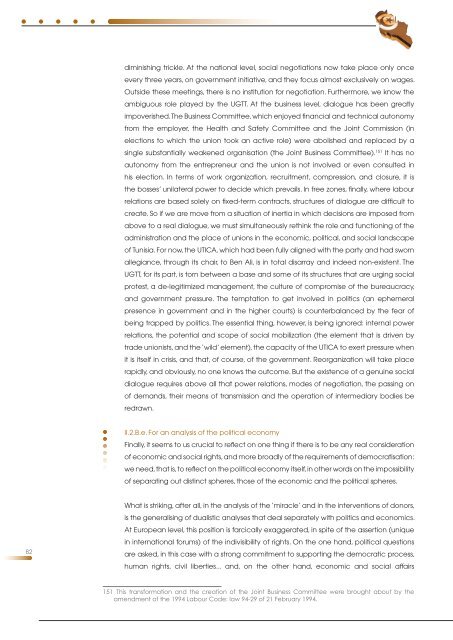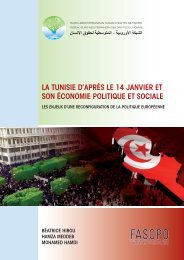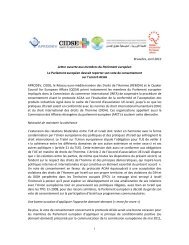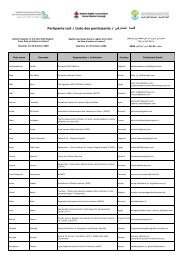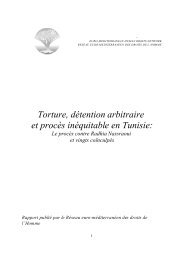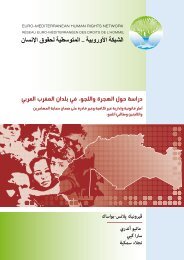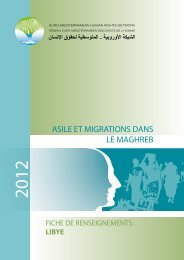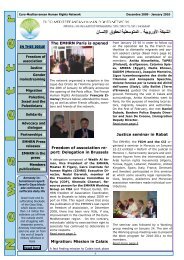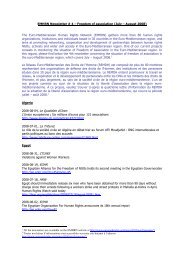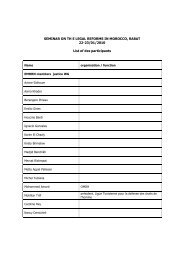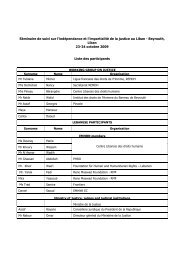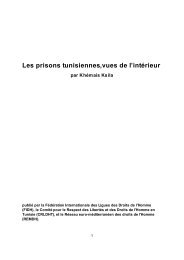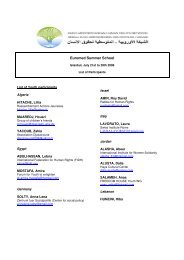tunisia after 14 january and its social and political economy - Refworld
tunisia after 14 january and its social and political economy - Refworld
tunisia after 14 january and its social and political economy - Refworld
You also want an ePaper? Increase the reach of your titles
YUMPU automatically turns print PDFs into web optimized ePapers that Google loves.
diminishing trickle. At the national level, <strong>social</strong> negotiations now take place only onceevery three years, on government initiative, <strong>and</strong> they focus almost exclusively on wages.Outside these meetings, there is no institution for negotiation. Furthermore, we know theambiguous role played by the UGTT. At the business level, dialogue has been greatlyimpoverished. The Business Committee, which enjoyed financial <strong>and</strong> technical autonomyfrom the employer, the Health <strong>and</strong> Safety Committee <strong>and</strong> the Joint Commission (inelections to which the union took an active role) were abolished <strong>and</strong> replaced by asingle substantially weakened organisation (the Joint Business Committee). 151 It has noautonomy from the entrepreneur <strong>and</strong> the union is not involved or even consulted inhis election. In terms of work organization, recruitment, compression, <strong>and</strong> closure, it isthe bosses’ unilateral power to decide which prevails. In free zones, finally, where labourrelations are based solely on fixed-term contracts, structures of dialogue are difficult tocreate. So if we are move from a situation of inertia in which decisions are imposed fromabove to a real dialogue, we must simultaneously rethink the role <strong>and</strong> functioning of theadministration <strong>and</strong> the place of unions in the economic, <strong>political</strong>, <strong>and</strong> <strong>social</strong> l<strong>and</strong>scapeof Tunisia. For now, the UTICA, which had been fully aligned with the party <strong>and</strong> had swornallegiance, through <strong>its</strong> chair, to Ben Ali, is in total disarray <strong>and</strong> indeed non-existent. TheUGTT, for <strong>its</strong> part, is torn between a base <strong>and</strong> some of <strong>its</strong> structures that are urging <strong>social</strong>protest, a de-legitimized management, the culture of compromise of the bureaucracy,<strong>and</strong> government pressure. The temptation to get involved in politics (an ephemeralpresence in government <strong>and</strong> in the higher courts) is counterbalanced by the fear ofbeing trapped by politics. The essential thing, however, is being ignored: internal powerrelations, the potential <strong>and</strong> scope of <strong>social</strong> mobilization (the element that is driven bytrade unionists, <strong>and</strong> the ‘wild’ element), the capacity of the UTICA to exert pressure whenit is <strong>its</strong>elf in crisis, <strong>and</strong> that, of course, of the government. Reorganization will take placerapidly, <strong>and</strong> obviously, no one knows the outcome. But the existence of a genuine <strong>social</strong>dialogue requires above all that power relations, modes of negotiation, the passing onof dem<strong>and</strong>s, their means of transmission <strong>and</strong> the operation of intermediary bodies beredrawn.II.2.B.e. For an analysis of the <strong>political</strong> <strong>economy</strong>Finally, it seems to us crucial to reflect on one thing if there is to be any real considerationof economic <strong>and</strong> <strong>social</strong> rights, <strong>and</strong> more broadly of the requirements of democratisation:we need, that is, to reflect on the <strong>political</strong> <strong>economy</strong> <strong>its</strong>elf, in other words on the impossibilityof separating out distinct spheres, those of the economic <strong>and</strong> the <strong>political</strong> spheres.82What is striking, <strong>after</strong> all, in the analysis of the ‘miracle’ <strong>and</strong> in the interventions of donors,is the generalising of dualistic analyses that deal separately with politics <strong>and</strong> economics.At European level, this position is farcically exaggerated, in spite of the assertion (uniquein international forums) of the indivisibility of rights. On the one h<strong>and</strong>, <strong>political</strong> questionsare asked, in this case with a strong commitment to supporting the democratic process,human rights, civil liberties... <strong>and</strong>, on the other h<strong>and</strong>, economic <strong>and</strong> <strong>social</strong> affairs151 This transformation <strong>and</strong> the creation of the Joint Business Committee were brought about by theamendment of the 1994 Labour Code: law 94-29 of 21 February 1994.


